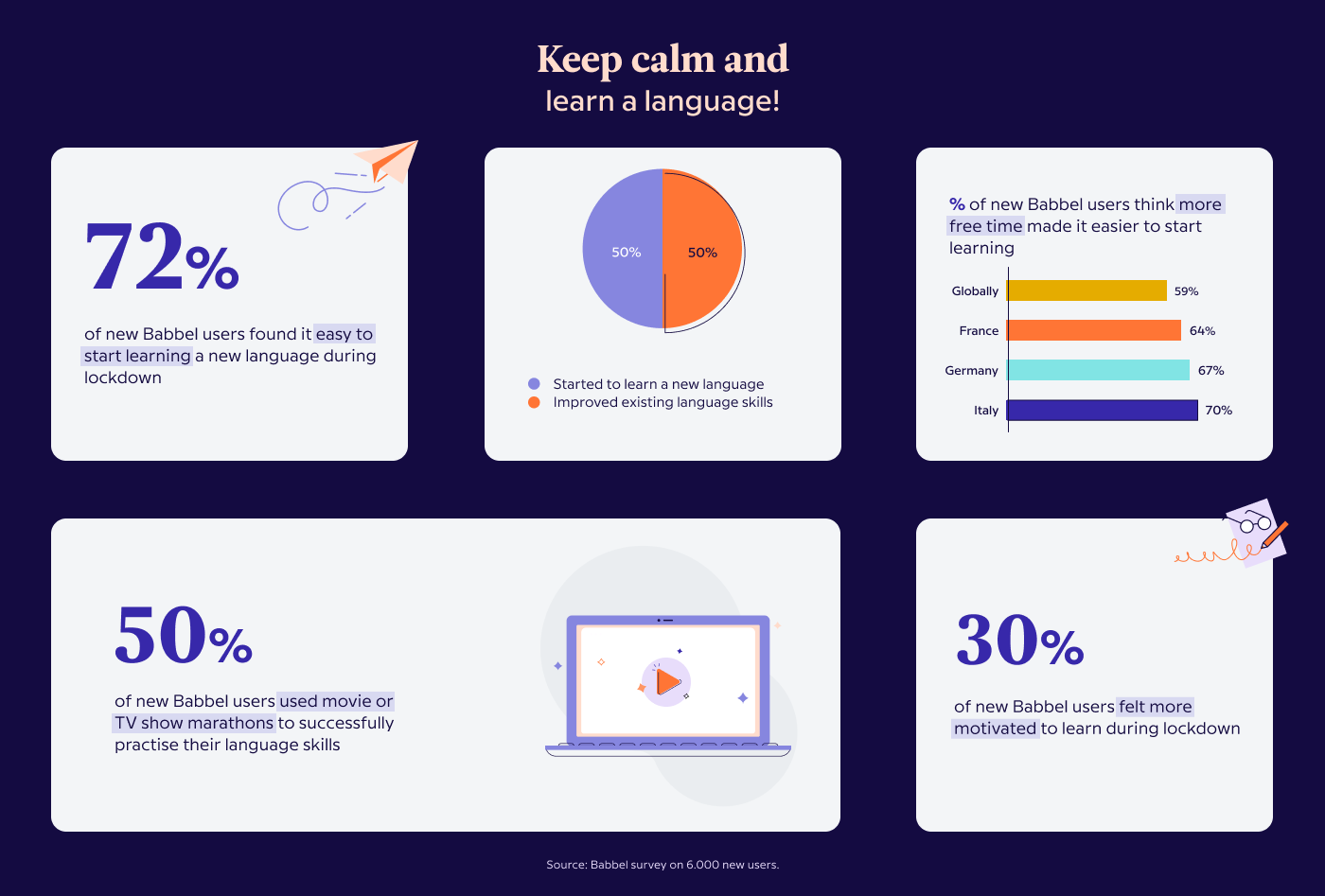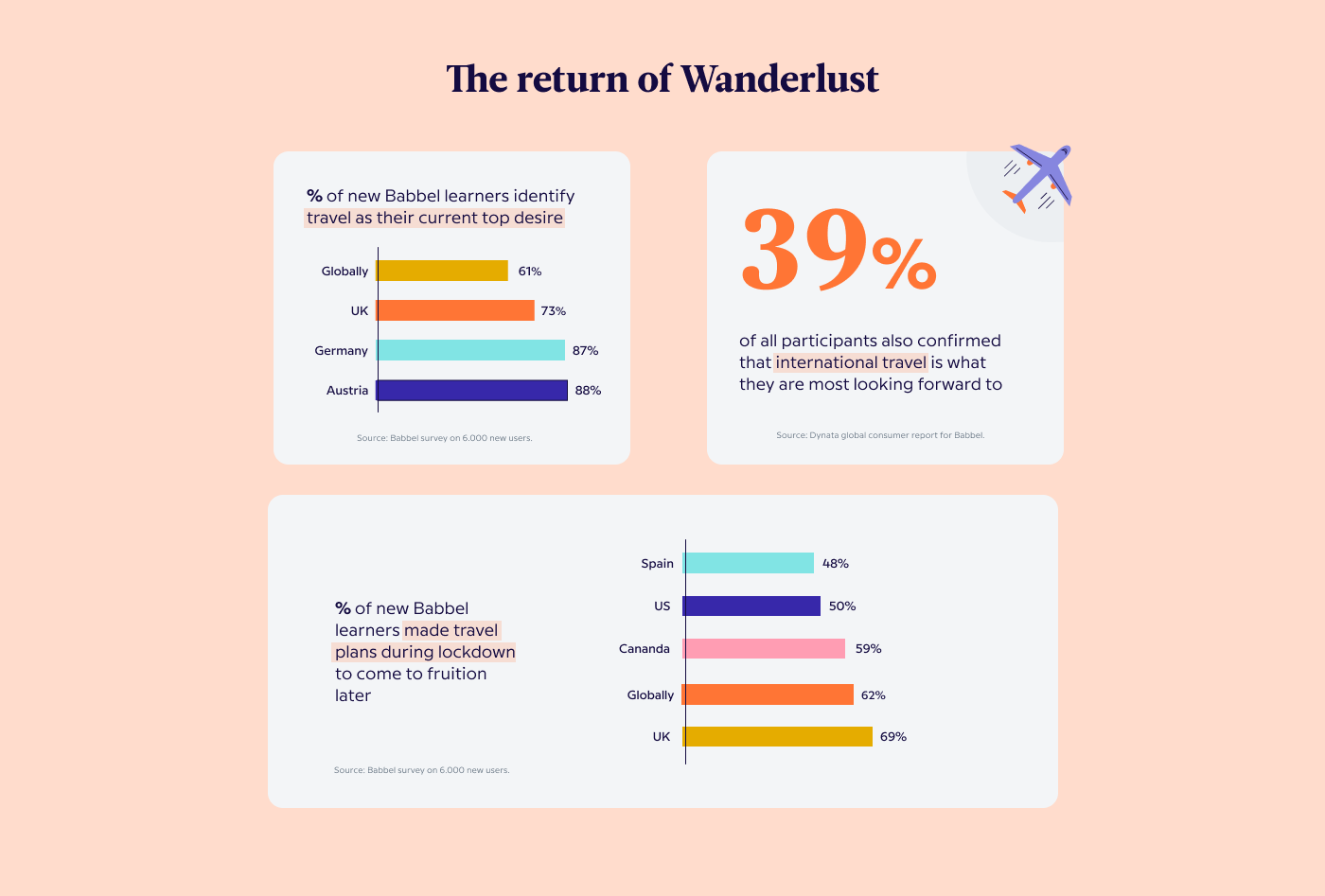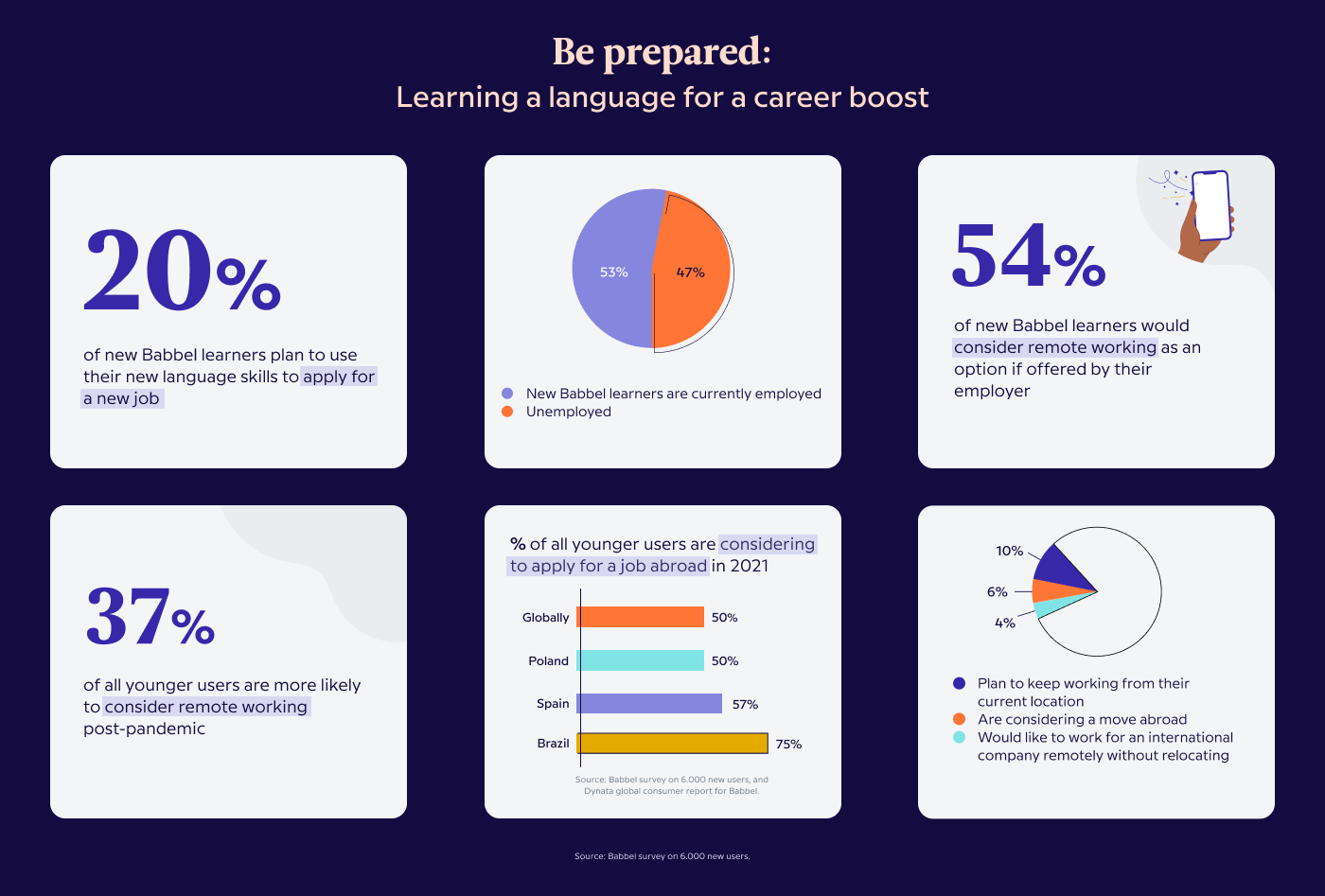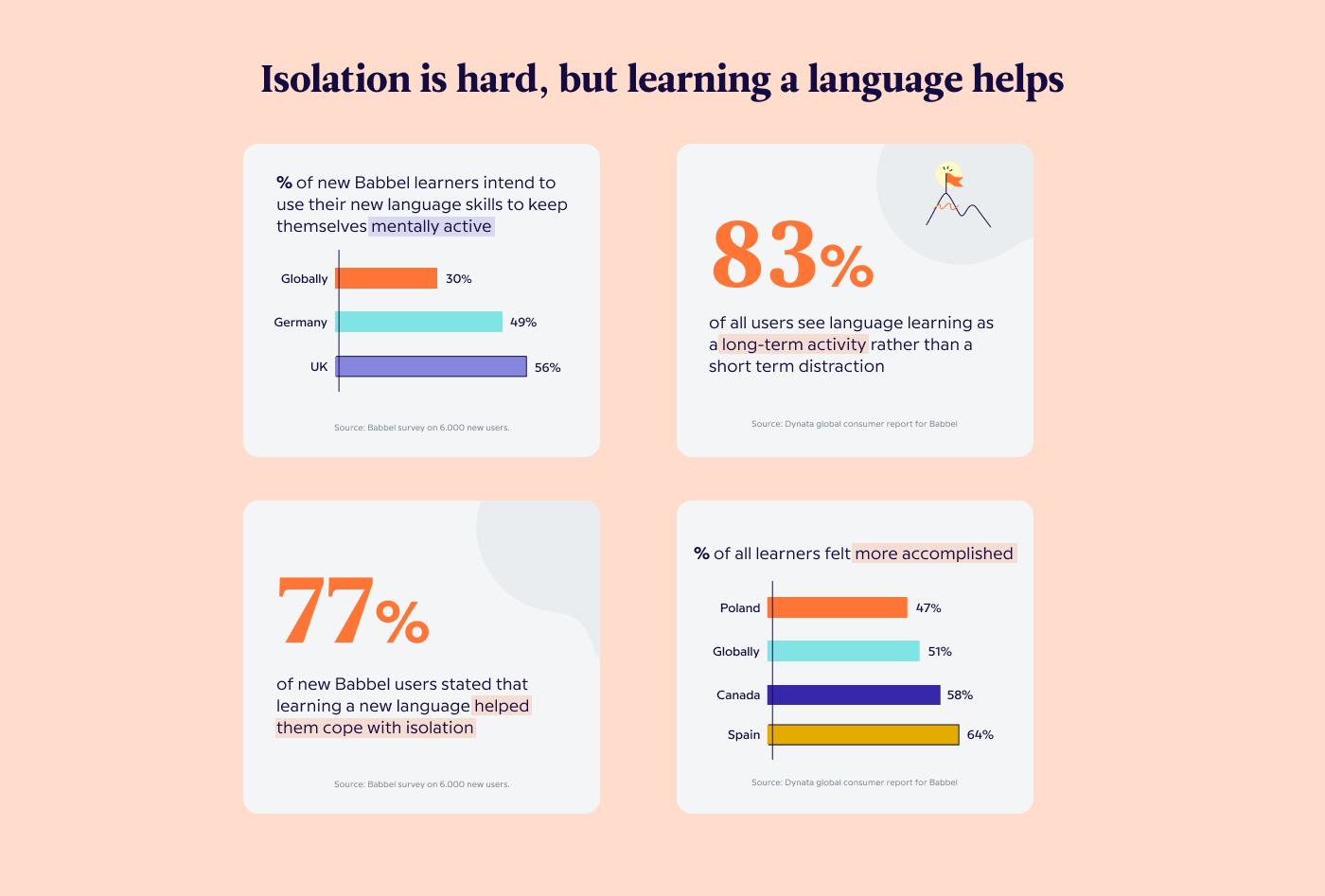
Why You’re Never Too Old To Learn A Language
We now know that training changes your brain even after only a few sessions. Translation: older brains can change too.

New Year’s has always been associated with renewal, finding new motivations, and new objectives. Never before have we had to assess our experiences with as much clear-sightedness as this year, all of us wanting to imagine the future with optimism and hope. One thing is certain: Even if 2020 turned our lives upside-down, it also helped us understand what really matters and what we took for granted.
What brings us together? What motivates us and allows us to turn to the future despite the difficulties? For us at Babbel, the answer is simple, and it’s also the ultimate goal of our mission: understanding — understanding yourself, understanding others, understanding the world around us, while overcoming language barriers. In an increasingly complex world, we’ve decided to ask our learners how they made it through 2020, what learning a new language means to them, and what their objectives and resolutions are for the new year.
2020 taught us one very important lesson: Staying in touch with the people we love, traveling freely, and opening up to other people and new opportunities aren’t straightforward, as natural as they may seem.
So why learn a new language when the possibilities to practice your new skills seem limited?
There are many reasons, and more than 6,000 new users around the world who joined Babbel between March and August 2020 explained why by responding to our survey. Other responses and data were also gathered by Dynata in an independent study carried out in December 2020.
You could also think logically that all the circumstances came together to encourage learning: For many, quarantine meant more free time beyond their school or professional commitments as well as the need to find a stimulating activity to do at home.
Who has never in their life said “I’d like to learn Spanish (or French, German, etc.), but I don’t have time for it…”?
Fittingly, many people decided to benefit from this time to set a new language-related objective, and the numbers speak for themselves: In 2020, Babbel reached more than 10 million active subscribers, with a 600% increase in new users during quarantine. An extraordinary result that makes us proud of our users and their determination, but which at the same time motivates us to continue to improve the quality of our product so that it’s even better placed to respond to everyone’s needs and journeys.
The responses also show a really interesting fact: No less than 50% of the survey respondents said that they took advantage of quarantine to combine language learning with Babbel and marathons of movies and shows in the original language. As a result, they noticed that their general comprehension improved and their motivation increased.
Watching shows and movies in their original language, with or without subtitles, is a great way to practice a language from home. It’s also one of the reasons Babbel introduced podcasts in original languages as part of its educational offering. Who said that you absolutely have to go abroad to immerse yourself in learning a language? Of course, that would be ideal, but in the meantime, do what you can!
The Babbel learners didn’t have any doubt about this: 61% of them wanted to travel again and discover the world as soon as possible. What’s not to understand? Traveling is an experience that’s difficult to do without — it stimulates our curiosity and our longing to discover and experience other cultures. As such, it’s of course one of the most powerful motivations for learning a new language. And if 2020 was a considerably difficult year for tourism, we hope the results of our survey bring a little bit of hope to those working in the sector: No less than 62% of new Babbel users said they started planning trips during quarantine which they want to make concrete as soon as possible. In the meantime, instead of dreaming of new destinations, the most active decided to study a new language. An excellent choice.
So if you can’t wait to travel again, here’s a good resolution for the year that’s just started: Choose a destination and learn the local language!
Uncertainty in the job market is justifiably one of the aspects that worries the respondents most: While 47% said they are currently unemployed, no less than one-third of workers said they were worried about their job security. Around the world, 20% of the Babbel survey participants plan to spotlight the language they learned during quarantine to supplement their resumé with new language skills (which is certainly a good strategy to stay competitive).
Furthermore, we can’t ignore the impact of remote work on how companies are organized and the possibility of new hiring: Indeed, many international companies that are no longer limited by the need to hire locally can use remote working to expand their workforce. How did our respondents react to this situation?
The results from Dynata are particularly interesting, especially among the youngest: 37% of respondents consider remote working to be a concrete possibility for 2021, and even 50% said they seriously consider work opportunities abroad.
Whatever your professional situation, one thing is certain: Learning a new language is never a waste of time, as our learners confirm!
Experts have emphasized it, and we’ve experienced it ourselves: The isolation due to quarantine has had significant consequences for our state of mind and our mental health. Of course, there wasn’t just the isolation. Uncertainty about the present, uncertainty about the future, fear for the health of our loved ones were unfortunately only some of the preoccupations we faced in 2020. How did the Babbel learners react to this atmosphere?
We won’t hide that we’re very pleased with the results: No less than 77% of our users said that learning a language helped them get through isolation during quarantine, 51% associate this experience with a feeling of personal satisfaction, 13% felt happier learning a language, and 8% felt closer to others. If you find this New Year’s somewhat gloomy, why not consider learning a new language? The Babbel method guides you step by step, helping you form good habits and celebrating even the smallest of victories. If you’re eager for success in 2021, a new language is not only a realistic objective, but also a rewarding objective with a clear effect on your state of mind!
Travel, work, mental health, and well-being are all good reasons to learn a new language. But if there’s one thing our users wanted to emphasize in their responses to our survey, it’s that even distance and isolation can’t lessen the desire to communicate, to be together, and to take care of the people we love. In fact, more than half of our learners say they’ve gotten back in touch with people they haven’t heard from in a while, some out of nostalgia, others simply to make sure their loved ones are healthy. Even those who weren’t necessarily familiar with digital communication tools have made the effort to learn, sending more emails, making video calls, and not without some difficulty expressing their feelings through the screen. That’s the case for 80% of our German respondents and 71% of Spanish-speakers.
One number, however, summarizes the essence of 2020: 79% of respondents say that the past year radically changed their perception of communicating with their parents and friends. And almost all the participants say they want to keep up with the new and old relationships from quarantine.
Whether it’s a conversation in a new language, in your native language, with people near or far, right now we’re certain of one thing: Understanding changes everything.
We now know that training changes your brain even after only a few sessions. Translation: older brains can change too.
Looking for some motivation to learn a new language? Look no further! Here’s your complete guide to the benefits of being bilingual.
From talking to loved ones in their native language, to improving mental health, here are eight proven benefits of learning a language.
Our experts Anna Stutter Garcia, Senior Learner Experience Designer and Cornelia Lahmann, French Project Manager for Didactics, analyse the results from the survey.
The key for success in learning is not free time in itself but the intent to spend time on a priority.
Introspection during lockdown seems to have brought people to find priorities, and grow.






